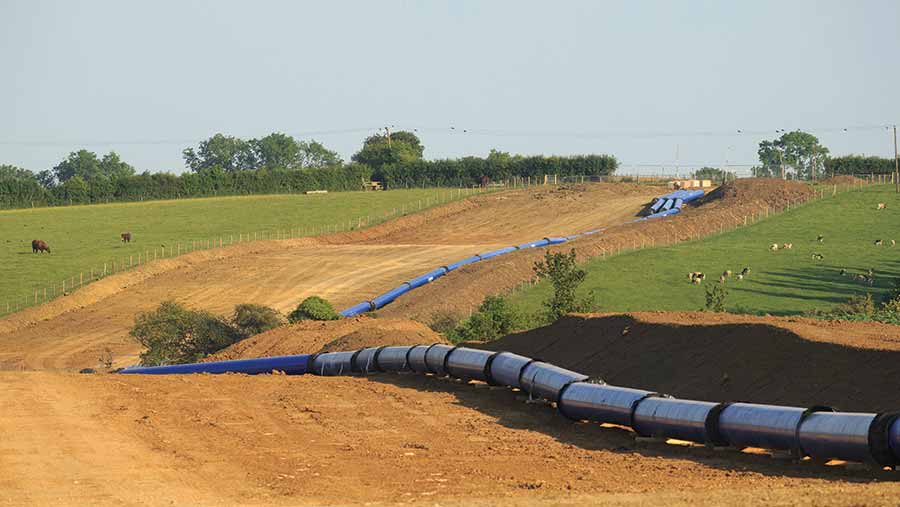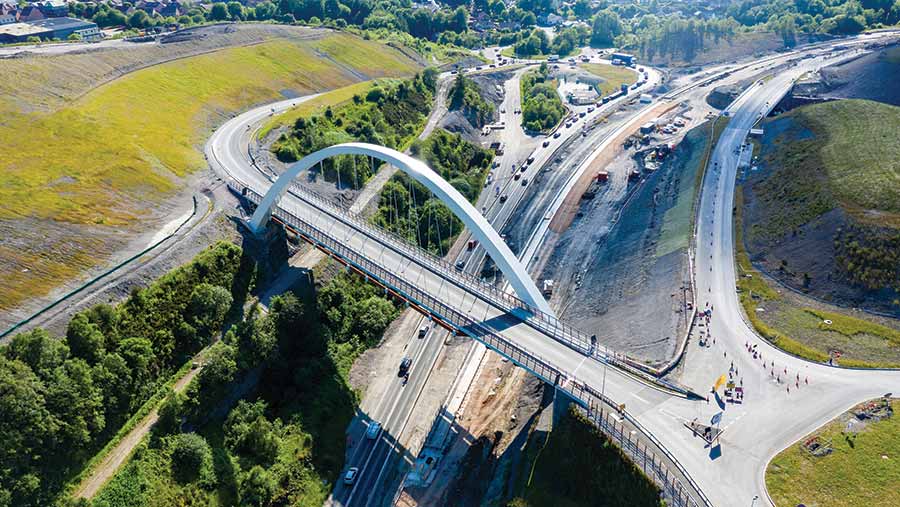How the infrastructure revolution will affect more farmers
 © Tim Scrivener
© Tim Scrivener If the UK is to meet its net-zero and levelling-up ambitions, huge investment in infrastructure will be required over the next 10-20 years, much of which will involve pipelines, power cables and roads through farmland.
This means ever more farmers and landowners are likely to find themselves subject to significant disruption and compulsory purchase orders (CPOs).
For example, National Grid estimates the switch to green energy will mean more than five times the amount of new electricity transmission infrastructure will need to be delivered in the next seven years than has been built in the past 30 years.
See also: Advice on long term land agreements as new markets develop
Demand for electricity is projected to increase by 50% by 2035, as more people shift towards electric vehicles and electric heating systems.
At the same time, the government has set a target to decarbonise the power system, which will require significant growth in offshore wind, solar and battery projects, with all the accompanying pipelines and cables that entails.
Water works
Significant amounts of investment are also planned for the water industry, both to secure supplies for future generations and to cut pollution levels.
As part of plans to reduce storm overflow discharges, a major programme has been launched to increase capacity at sewage treatment works, as well as upgrading sewer pipelines.
Anglia Water is in the process of building a new water mains network – called the Strategic Pipeline Alliance (Spa) – across East Anglia, which it says will be longer than any UK motorway.
Ofwat also recently gave the green light for three new public water supply reservoirs to be built in Oxfordshire, Lincolnshire, and Cambridgeshire.
These would be the first public reservoirs constructed since the early 1990s.
Transport
On the transport side, there is a host of initiatives ranging from the HS2 rail project through to the creation of the Lower Thames Crossing, which will be a new road crossing connecting Kent and Essex.
What these projects have in common is that they are regarded as nationally significant infrastructure projects (NSIPs), which mean they go through a separate planning process to other developments.
The NSIP consenting regime was introduced in 2008 and aims to make it quicker and easier to get major infrastructure projects off the ground.
However, in February 2023 the government published an action plan for the reform of NSIPs which highlighted that the system is not working with the speed that is now required and that further reform is needed to remove bottlenecks.
Jeremy Moody, secretary and adviser to the Central Association of Agricultural Valuers, says given almost all infrastructure projects are inter-urban, they will inevitably have an effect on landowners, as pipes and cables will need to cross the countryside between towns and cities.
“If a project qualifies as an NSIP then the developer applies for an accelerated form of planning called a development consent order [DCO], which can also include the right to compulsory purchase land,” he says.
Disruption
“The whole process is hugely disruptive for the farmers involved, who get no personal benefit from the schemes, but have to live with the consequences.”
Jeremy says the government is planning a number of changes to make the NSIP process easier, while at the same time there is lots of talk about the need for changes to the compulsory purchase regime.
In late May, the Labour Party indicated that if in power it would consider proposing that local authorities should be able to purchase land for house building at existing use rather than market use value.
This follows a government consultation in summer 2022, titled Compulsory purchase: Compensation reforms, which raised the idea of capping or removing hope value, either for compulsory purchase generally or in relation to specific types of schemes.
This approach has now been amended, as part of the Levelling-Up and Regeneration Bill, to limit its use to public sector acquirers needing land for affordable housing, education or health uses.
If the bill is passed without further changes, this would allow public sector bodies to apply to the secretary of state to enable them to buy land at its existing use value, rather than market value, for those uses.
“That is quite narrow, but it is a breach of the principle that you pay market value for land that you are taking from someone who is an unwilling seller,” Jeremy says.

© Whitcomberd/ Adobe Stock
Meanwhile, earlier this year the government announced that the Law Commission for England and Wales had been asked to review the legislation governing compulsory purchase.
A paper setting out its recommendations is expected later this year.
Jeremy says the Central Association of Agricultural Valuers (CAAV) has already had a meeting with the Law Commission and impressed on officials the need for landowners to be fairly compensated when subject to compulsory purchase.
“If people get the impression that they are not going to be fairly dealt with then they resist and that makes everything slower.
“We favour a ‘best-value’ approach on the grounds that if a project is delivered in a way that gets machines on the ground months earlier, we will have saved a lot more money than the value of the land everyone is arguing about.”
Mark Gilkes, partner with Fisher German, is part of the firm’s infrastructure consultancy team, acting mainly on behalf of utility companies to deliver new infrastructure and then managing it afterwards.
“That gives us a fairly unique view. As well as getting things built, we have a relationship with the landowner after a scheme has been completed,” he says.
Mark says the key to successful projects is good communication, where developers are proactive in engaging with landowners to get their views.
“The schemes I see deliver in the best way for all parties are those with a largely developer-led dialogue, as it becomes frustrating for landowners if they are constantly chasing for information.”
There is a distinction between how different acquirers deal with projects.
For example, utility companies are unlikely to want to own the land; they need the right to go over it and their preference will be to secure that through voluntary agreements.
However, if a road or railway is being built the acquiring authority will need to own the land and so will generally take the compulsory purchase route.
This is also because it is a way to clear the title of any other interests, offering a clean slate for the development.
“All the developers I have worked for are very keen to deliver voluntary agreements; the CPO option is there to deliver the scheme if we can’t.
“Under the NSIP regime you may not get CPO powers unless you can show you have taken a reasonable approach towards securing voluntary agreements,” says Mark.
If the Planning Inspectorate doesn’t think you’ve been acting reasonably, it may not grant the CPO powers.”
Timescales
Mark says it can take four or five years to get an NSIP project off the ground because developers might need to spend two years carrying out multiple consultations and environmental surveys before they can even go to an inquiry.
“The amount of information you have to pull together is huge – some of these applications get delivered on pallets.
“I am not saying the information in there is not important, but it feels in the round that these projects are getting more cumbersome and the process can be frustrating for farmers.”
NSIP basics
Nationally significant infrastructure projects (NSIPs) are large-scale projects related to energy, transport, water, waste water and waste which are judged to be of national importance and can, therefore, go through a separate planning process to other development projects.
Instead of applying for planning permission through the usual route, developers apply for a development consent order (DCO), with applications managed by the Planning Inspectorate and the final decision resting with the relevant secretary of state.
There is a provision as part of the NSIP regime which allows developers applying for a DCO for an infrastructure project to add up to 500 homes to the application, if housing is needed to meet a functional need of the project.
Compulsory purchase orders can then be used to acquire the required land.
Tips for affected farmers
Farmers who are affected by a nationally significant infrastructure project scheme are advised to seek professional advice.
The party acquiring land for such a project is required to cover the landowner’s related professional fees.
For land subject to compulsory purchase currently, the rules are broadly that the farmer will get paid for any loss of value in the land, but also for “disturbance and other matters”.
Landowners will need to weigh up whether it is in their best interests to focus on reducing the effects of the development, rather than going for maximum compensation.
Frequently it is the accommodation works – such as screening from the road and making sure any land drainage is properly looked after – which have the most value in the long term, says Jeremy Moody.
